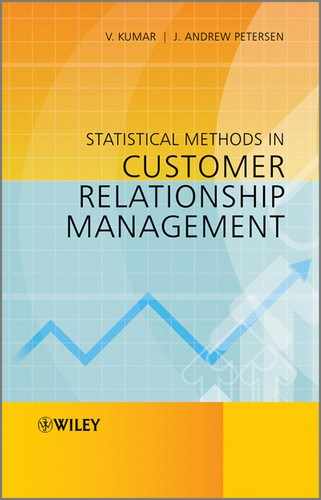9.4 Customized Marketing Campaigns
Customized marketing campaigns, or one-to-one marketing campaigns, refer to campaigns containing marketing messages that are tailored to a selected individual customer based on his/her specific profile, preference, and needs. In the past, to reach the maximum number of clients, and to achieve economies of scale, firms employed mass marketing and targeted the entire market. As marketing progresses from being product-centric to becoming customer-centric, marketers have started to employ campaign-based marketing and target certain segmented groups of customers. Customized marketing is expected to be the next prevalent marketing trend that promises to enable firms to gain competitiveness through differentiation in an increasingly competitive market. It is important for marketing managers to be aware of this emerging trend as they formulate CRM strategies for the firm.
One-to-one marketing has become a widely used marketing strategy due to the number of benefits it offers. First, it is an effective way to ensure information is conveyed to the targeted customers by overcoming media clutter. Given the increasing number of media outlets, one common problem faced by mass marketers is that they are unable to convey their messages to consumers who are inundated with too much information. By targeting a specific individual customer, marketers build a customized marketing campaign and choose a more effective way to communicate to the customer, and ensure the message is conveyed to that particular customer. Second, implementing customized marketing campaigns is a perfect way for firms to build a long-term relationship with customers. Satisfied and loyal customers can eventually provide excellent referrals for firms. Customized marketing ultimately facilitates the paradigm shift from selling the product to selling the benefit to customers. Finally, implementing customized marketing campaigns is a great way for firms to differentiate themselves from their competitors.
Many firms are currently implementing or on their way toward implementing a one-to-one marketing strategy. Amazon.com uses information acquired from individual customer transactions and profiles to filter and determine the type of products it will recommend to each customer. Portola Plaza Hotel in California gathers information about guest preferences and, through detail analysis, send mails to individual guests to offer customized discounts and promotional deals. ICICI-Lombard, an insurance company, uses customer surveys to prepare personalized insurance plans for its customers.
Perhaps the biggest deterrents for customized marketing campaigns to be a preferred marketing approach are the amounts of customer-level information required to develop campaigns, and the high cost involved in obtaining such customer-level data. As customers are more involved in social network activities, this information will be more readily available to firms through many social network providers. Furthermore, the success of a customized campaign lies in identifying the right customer to target. As firms move from a mass marketing approach to a segmented marketing approach, the availability of appropriate customer-level information and the ability to identify the right customer to target will help companies design and implement successful customized campaigns. The quantitative models discussed in the previous chapters can serve as good starting points for firms to identify the right customer and launch effective customized marketing campaigns.
Looking ahead, customized campaigns can become a mainstream marketing approach when marketers address some important issues. First, firms must know their customers well, identify the most valuable customers, and maintain interaction with each of these customers. All of these require a thorough analysis of their customers, and the maintenance of a comprehensive customer database. Second, firms need to integrate different departments within an organization (e.g., marketing, sales, production, distribution, finance, and so on) to devise a customized marketing campaign for each of the targeted customers. Other important issues that require careful attention from marketers and researchers include the following:
- What are the relevant factors that impact firms' customized marketing strategies? How important are market-specific factors (e.g., market growth rate, competitive landscape, etc.) in the formulation of customized marketing strategies?
- Currently, firms usually have very limited information about competitors' customers. Under what conditions can sharing customer information with competitors be profitable? [7]
- What is the role of customized marketing in reducing information overload and aiding customer decisions? [8]
- What pricing structure should firms adopt for customized marketing?
